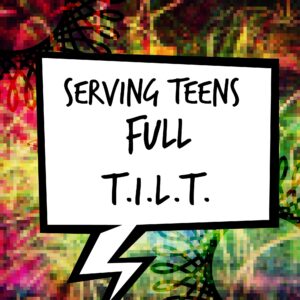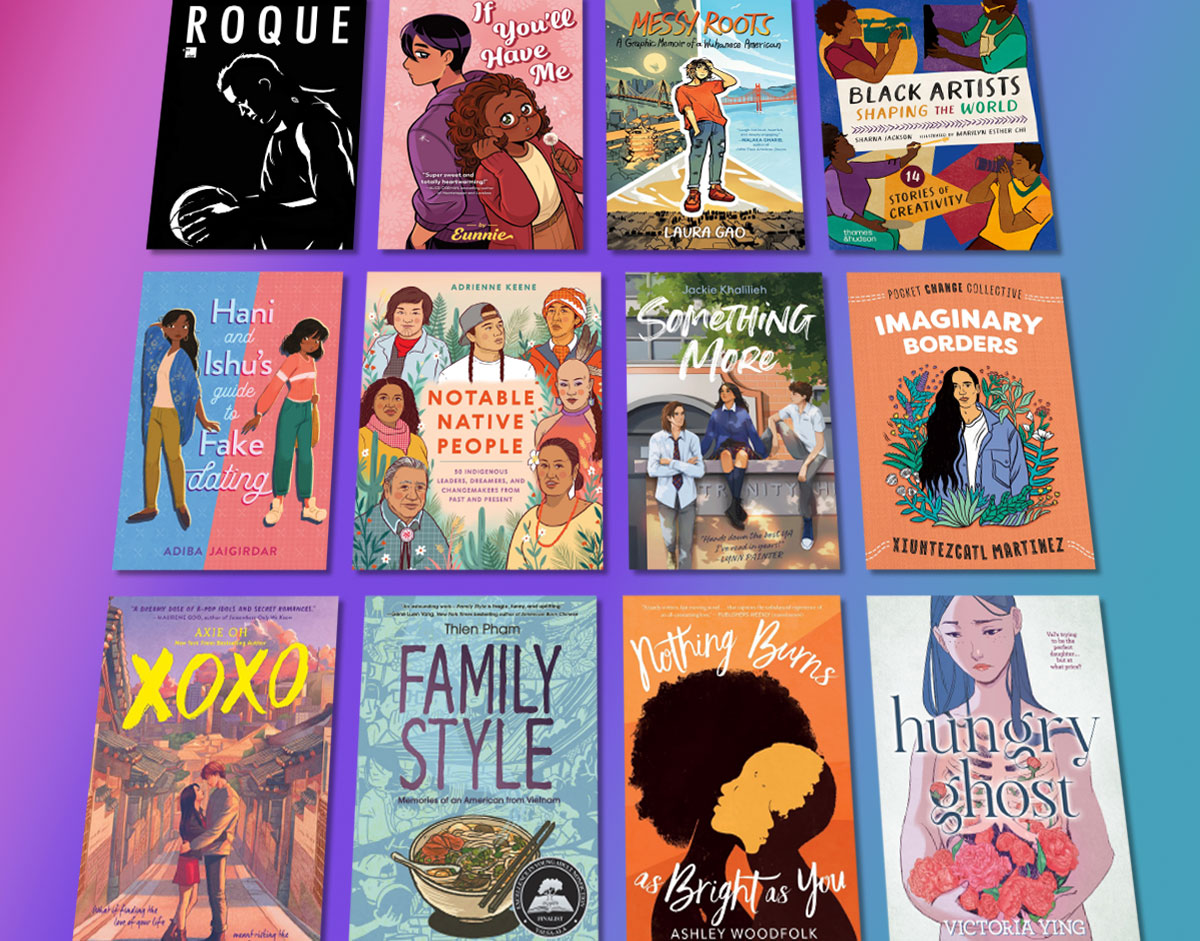Serving Teens Full T.I.L.T. : Diverse Teens, Diverse Needs (Eden Grey)
 When talking about serving teens, we can’t neglect the need to talk about diversity because like all people groups, teens are a diverse population. We can talk in general terms about the development of teens, but at the end of the day each teen is a unique person shaped by a unique genetic combination and individual life narratives. There is lots of great discussion happening right now about diversity, which is a necessary and important conversation. It’s a big topic, much bigger than one blog post could cover. So for the purposes of today’s post we decided to talk specifically about the diverse needs of teens surrounding the issues of mental health and autism spectrum issues. This is by no means the full discussion that we want and need to be having regarding diversity, which is why we recommend that you follow important conversations like #WeNeedDiverseBooks and #FSYALit (which focuses on religious diversity).
When talking about serving teens, we can’t neglect the need to talk about diversity because like all people groups, teens are a diverse population. We can talk in general terms about the development of teens, but at the end of the day each teen is a unique person shaped by a unique genetic combination and individual life narratives. There is lots of great discussion happening right now about diversity, which is a necessary and important conversation. It’s a big topic, much bigger than one blog post could cover. So for the purposes of today’s post we decided to talk specifically about the diverse needs of teens surrounding the issues of mental health and autism spectrum issues. This is by no means the full discussion that we want and need to be having regarding diversity, which is why we recommend that you follow important conversations like #WeNeedDiverseBooks and #FSYALit (which focuses on religious diversity).
Teens Dealing with Mental Health Issues
One often underrepresented aspect of diversity is mental health. Millions of American teens have a diagnosed mental health issue, and many also remain undiagnosed and suffering. The stigma of mental illness is real and affects our youth today. While a physical disability or debilitating disease can be seen on a person’s body, mental health issues are invisible. They are inside our heads, not something that people can see and understand just by looking at us. Differences in mental health represent diversity in our teens, and they have diverse service needs. Teen Librarians can help fight that stigma, and point teens in the direction of the help that they need to get diagnosed, or get treatment.
ADVERTISEMENT
ADVERTISEMENT
Millions of teens have diagnosed mental health issues, and remain untreated
About 20%, or 1 in 5, adolescents have a diagnosed mental health issue, while 1 in 4 adults suffer from a diagnosable mental health issue. Currently adolescents make up 14% of the U.S. population, meaning 1 in 5 of those 40 million teens has been diagnosed at some point in their life with a mental health issue. According to the CDC’s NHANE Survey, of those 8 million youth, only half have received mental health treatment within the past year. That’s 4 of the 40 million adolescents today receiving treatment for diagnosed mental health issues.
Millions of teens are at risk without mental health treatment
The risk of untreated mental health issues is serious. When issues go undiagnosed, they cannot be treated effectively, and greatly increase the risk of suicide attempts. Suicide is the third leading cause of death for youth between the ages of 10 and 24, leading to about 4600 deaths each year. However, far more youth unsuccessfully attempt suicide. According to the CDC’s Violence Prevention Initiative, about 157,000 youth every year receive emergency medical care for self-inflicted injuries.
As adults who work with youth we know that many of these issues go undiagnosed, and therefore untreated. The National Institute of Mental Health stresses that early detection of mental health issues is crucial to youth development and safety. The longer issues go undiagnosed, the more difficult they are to treat. The activities and behaviors enforced during adolescents formulate neural pathways that will stick around throughout a person’s life. Bad habits, from biting your nails to doing illegal drugs, are that much harder to stop as an adult if the habits are formed as a teen. Mental health issues are no different. While many mental health issues are treatable with a combination of medicine and therapy/counseling, the treatment is more effective and has long-lasting effects as an adolescent.
The library’s third space as a treatment center
While the library, its staff, and patrons are no replacement for prescribed treatment from a mental health professional, the safe and non-judgmental third space, social support group, and validation through bibliotherapy are important supplements to a teen’s mental health treatment.
The library is a place that teens choose to go to on their own, not somewhere they are forced to be. Attending teen programs and being involved in Teen Services is a choice that teens make. The unbiased, nonjudgmental setting of a public library is a safe haven for teens with issues. They are able to engage in social activities with their peers under the supervision of an understanding adult, the Teen Librarian. The Librarian can also form a bond with the teen, creating a connection through which to share information and resources, such as suicide hotlines, self-help books, non-fiction about mental disorders, and fiction that the teen will find therapeutic.
ADVERTISEMENT
ADVERTISEMENT
Getting this information from a supportive, cool adult (that’s you!) makes all the difference to a teenager who is constantly being told what to do, how to act, and who to be when they are at school and at home. Fostering acceptance of mental health treatment, counseling, and medication is also an important role for a Teen Librarian. Combating the stigma of receiving medication and treatment for mental health issues is an important step in getting more teens to seek treatment.
Many schools have free counseling programs for teens who may be unable to get help on their own, or who may not feel comfortable asking their family for assistance. If the teen feels like school counselors aren’t a viable option, use every resource possible to find a place for them to seek help. Free hotlines can make a world of difference, and many cities have free or low-cost counseling centers for at-risk teens.
Teens with Autism Spectrum Disorders
Teens are often overlooked when libraries discuss services for youth on the spectrum. How do you program for such a small demographic of patrons? Shifting your usual programs to be targeted toward teens with ASD can be quick and easy. Offer movies with low volume and more lights, without the scent of popcorn or rowdiness of neurotypical teens. Have video game sessions just for special needs teens, with low volume, small screens, and little to no competitive play. Try out an online book club, where teens at the higher functioning end of the spectrum may feel more comfortable communicating and interacting with others.
Can you incorporate the special needs of teens with ASD into your regular programming? Definitely. Allow parents, guardians, or siblings attend programs with the teen. Find out what the teen’s special interests are and get them focused on that, instead of on the typical unstructured chaos of some teen programs. Encourage the other attendees to maintain personal boundaries, both physical and verbal, when teens on the spectrum are around.
What can you do as a library worker?
-
Accept the teens for who they are.
-
Remain nonjudgmental.
-
Actively maintain a positive attitude toward treatment.
-
Suggest books that the teens may find therapeutic, or as an escape.
-
Point teens in the direction of information they may be lacking.
-
Provide resources for local and national treatment centers.
Recommended Reading for Teens & Their Librarians
Non-Fiction:
Mental Health Information for Teens by Lisa Bakewell
The Autism Playbook for Teens by Irene McHenry & Carol Moog
Teen Angst? Naaah… by Ned Vizzini
Fiction:
Perfect by Natasha Friend
Teeny Little Grief Machines by Linda Oatman High
Willow by Julia Hoban
Please Ignore Vera Dietz by A.S. King
Crazy by Amy Reed
Schizo by Nick Sheff
100 Sideways Miles by Andrew Smith
It’s Kind of a Funny Story by Ned Vizzini
My Heart and other Black Holes by Jasmine Warga
Book Lists:
Bibliotherapy for Teens: An Expanded Booklist
Where to go for help:
National Suicide Prevention Lifeline
1 (800) 273-8255
www.suicidepreventionlifeline.org
National Safe Place – Youth Runaway Safeline
1-800-786-2929
Substance Abuse and Mental Health Services Administration
Treatment Referral Service: 1-800-662-HELP
Online treatment locator: http://findtreatment.samhsa.gov/
Mental Health.gov
http://www.mentalhealth.gov/index.html
Local Treatment Finder:
Footnotes:
1. http://www.nccp.org/publications/pub_878.html
2. http://www.actforyouth.net/adolescence/demographics/#1
3. http://www.cdc.gov/violenceprevention/pub/youth_suicide.html
4. http://www.nlm.nih.gov/medlineplus/childmentalhealth.html
More About Autism and Teens at TLT:
- Teen Issues: Autism and Libraries
- On the Spectrum and @ Your Library (Guest post by Matthew Ross)
- Teen Issues: Teens and Autism and Future Horizons
- Autism & Libraries: A Q&A with J. D. Kraus
- Teens and Autism: What does it mean to be “typical”?
- Atticus Was Right: The remarkable story about a boy with autism, a bully, and a book (Guest post by Amianne Bailey)
- Book Review: Perfect Escape by Jennifer Brown (sibling with OCD)
- The Power of Reading: Stuck in Neutral by Terry Trueman
More About Mental Health Issues at TLT:
- Top 10: Books dealing with mental health (guest post by Kim Baccellia)
- How Mental Illness Tried and Failed to Ruin My Life (guest post by Robison Wells)
- Mental Health Medications Are Not Your Enemy
- Teens and Mental Health Resources
Serving Full T.I.L.T. series:
January 14 By the Numbers, making the case for teen services using basic demographic information (Karen Jensen)
January 21 Sarcasm, Spice and Everything Awesome: The Developing Teen (Rebecca Denham)
January 28 Teen Brain Science 101 (Heather Booth)
February 4 Asset Building 101, How using the 40 Developmental Assets can help us plan and evaluate teen programming (Karen Jensen)
February 11 Diverse teens, diverse needs (Eden Grey)
February 18 Sharing stories, how knowing and sharing the stories of our teens can help make the case (Heather Booth)
February 25 Empathy, remembering what it means to be a teen and how it makes us better teen services librarians (Heather Booth)
March 4 A Teen Services 101 Infographic (Rebecca Denham and Karen Jensen)
March 11 Talking Up Teens: Discussing Teen Services with Library Administration (Eden Grey)
Filed under: Serving Full TILT
About Karen Jensen, MLS
Karen Jensen has been a Teen Services Librarian for almost 30 years. She created TLT in 2011 and is the co-editor of The Whole Library Handbook: Teen Services with Heather Booth (ALA Editions, 2014).
ADVERTISEMENT
ADVERTISEMENT
SLJ Blog Network
The Ultimate Children’s Book Illustrator Gift Guide 2024
MORE 2025 ALA YMA Predictions! American Indian Youth, Asian/Pacific American Awards, and Schneider Family
Flash Gordon Adventures | This Week’s Comics
The Seven Bills That Will Safeguard the Future of School Librarianship
ADVERTISEMENT







